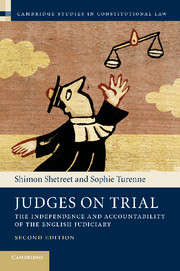Book contents
- Frontmatter
- Contents
- Foreword
- Acknowledgments
- Table of cases
- Table of legislation
- List of Abbreviations
- 1 Introduction
- 2 Constitutional steps towards judicial independence
- 3 The structure and governance of the English judiciary
- 4 Judicial appointments
- 5 Standards of conduct on the bench
- 6 Standards of conduct in extra-judicial activities
- 7 Immunity, discipline and removal of judges
- 8 Freedom of expression and public confidence in the judiciary
- 9 Conclusions
- Annex 1 Courts and tribunals structure
- Index
- References
7 - Immunity, discipline and removal of judges
Published online by Cambridge University Press: 05 June 2014
- Frontmatter
- Contents
- Foreword
- Acknowledgments
- Table of cases
- Table of legislation
- List of Abbreviations
- 1 Introduction
- 2 Constitutional steps towards judicial independence
- 3 The structure and governance of the English judiciary
- 4 Judicial appointments
- 5 Standards of conduct on the bench
- 6 Standards of conduct in extra-judicial activities
- 7 Immunity, discipline and removal of judges
- 8 Freedom of expression and public confidence in the judiciary
- 9 Conclusions
- Annex 1 Courts and tribunals structure
- Index
- References
Summary
Introduction
7.1 We saw in Chapters 5 and 6 how standards of judicial conduct are now expressly construed as a defining component of public trust in the judiciary. In this chapter we focus upon the process of regulation of judicial conduct. While tenure of judicial office is a fundamental element of judicial independence, disciplinary procedures apply to judges who misbehave in one way or another, albeit that few judges have had charges brought against them. The power to remove and discipline judges directly affects individual judges as well as the judiciary as a whole, thus the grounds and mechanisms for the discipline and removal of judges are of vital importance to the independence of the judiciary. They must be subject to proper safeguards, and their analysis forms the major part of this chapter. Little has been written in recent times about removal and discipline of English judges, no doubt because of the proud record of English judges with regard to their professional behaviour. The separation of powers enshrined in the Constitutional Reform Act 2005 (CRA) invites a renewed scrutiny, however, of the role played by the executive and the legislature in the exercise of the powers of discipline and removal of judges. Until the CRA, the power to discipline was in the hands of the Lord Chancellor, also the head of the judiciary. Following the transfer of the latter responsibility to the Lord Chief Justice in 2005, the power to discipline judges is now shared between the Lord Chief Justice and the Lord Chancellor, placing safeguards upon its use. In addition to disciplinary actions, the procedures of impeachment and address of removal, which can lead to the vacation of senior judicial office, are also considered.
- Type
- Chapter
- Information
- Judges on TrialThe Independence and Accountability of the English Judiciary, pp. 272 - 356Publisher: Cambridge University PressPrint publication year: 2013



